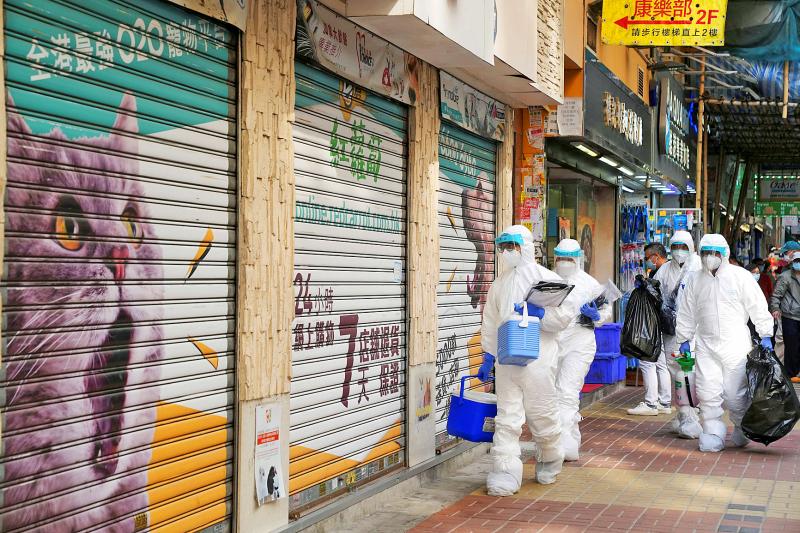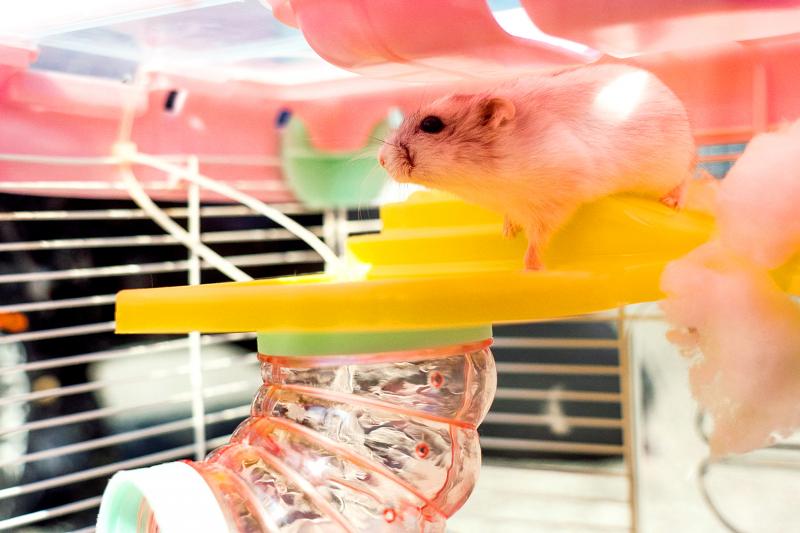Hong Kong’s government yesterday faced outrage over its decision to cull hundreds of small animals after hamsters in a store tested positive for COVID-19.
Like China, Hong Kong maintains a staunch “zero COVID” policy, stamping out the merest trace of the virus with contact tracing, mass testing, strict quarantines and prolonged social distancing rules.
Its latest measures target hamsters and other small mammals — including chinchillas, rabbits and guinea pigs, which authorities on Tuesday said would be culled as a “precautionary measure.”

Photo: Reuters
The drastic move came after hamsters sold at the Little Boss pet shop tested positive for the Delta variant of SARS-CoV-2 — now rare in Hong Kong.
Officials in personal protective gear carried red garbage bags marked with biohazard warnings out of the shop on Tuesday night.
Authorities “strongly encouraged” anyone who bought a hamster after Dec. 22 last year to give up their pet for culling.

Photo: AFP
Animal lovers across Hong Kong reacted with alarm: The Society for the Prevention of Cruelty to Animals (SPCA) denounced the decision and a Change.org petition garnered more than 23,000 signatures in less than a day.
“The SPCA is shocked and concerned over the recent announcement about the handling of over 2,000 animals,” it said in a statement yesterday. “We urge pet owners not to panic or abandon their pets.”
One hamster lovers’ group said it received more than 20 inquiries about whether owners had to give up their furry friends.
Authorities on Tuesday said that the COVID-19-positive creatures were believed to be imported from the Netherlands.
“Internationally, there is no evidence yet to show pets can transmit the coronavirus to humans, but ... we will take precautionary measures against any vector of transmission,” Hong Kong Secretary for Food and Health Sophia Chan (陳肇始) told a news conference.
About 1,000 animals sold at Little Boss and another 1,000 hamsters in dozens of pet shops across Hong Kong would be culled, authorities said.
The import of small mammals has also been banned.
One owner — who bought her pet on Jan. 1 — reacted in defiance.
“No one can take my hamster away unless they kill me,” she told the Standard newspaper yesterday.
She pushed back on the government’s mass cull, recalling a recent birthday party attended by officials that resulted in multiple COVID-19 infections and left Hong Kong’s leadership red-faced.
“Will they also kill all infected COVID-19 patients and their close contacts?” she said. “If all people who attended the birthday party are culled then I will hand my hamster to the government.”
A grim humor settled on Hong Kong-centric social media accounts, with people publishing illustrations of hamsters wearing surgical masks or facing off against the Grim Reaper.
However, the government’s decision has some supporters.
Microbiologist Yuen Kwok-yung (袁國勇), who is also a government adviser, praised the measure as “decisive” and “prudent.”
Some heeded the call to give up their rodents yesterday, with one man saying he agreed with the authorities’ rationale of limiting the spread of the virus, local broadcaster RTHK reported.
Asked about Hong Kong’s hamster cull, the WHO said some animal species can be infected with COVID-19, and animals can reinfect humans.
“That risk remains low, but it is something that we are constantly looking at,” said Maria Van Kerkhove, technical lead of COVID-19 response at the WHO.

VAGUE: The criteria of the amnesty remain unclear, but it would cover political violence from 1999 to today, and those convicted of murder or drug trafficking would not qualify Venezuelan Acting President Delcy Rodriguez on Friday announced an amnesty bill that could lead to the release of hundreds of prisoners, including opposition leaders, journalists and human rights activists detained for political reasons. The measure had long been sought by the US-backed opposition. It is the latest concession Rodriguez has made since taking the reins of the country on Jan. 3 after the brazen seizure of then-Venezuelan president Nicolas Maduro. Rodriguez told a gathering of justices, magistrates, ministers, military brass and other government leaders that the ruling party-controlled Venezuelan National Assembly would take up the bill with urgency. Rodriguez also announced the shutdown

Chinese President Xi Jinping’s (習近平) purge of his most senior general is driven by his effort to both secure “total control” of his military and root out corruption, US Ambassador to China David Perdue said told Bloomberg Television yesterday. The probe into Zhang Youxia (張又俠), Xi’s second-in-command, announced over the weekend, is a “major development,” Perdue said, citing the family connections the vice chair of China’s apex military commission has with Xi. Chinese authorities said Zhang was being investigated for suspected serious discipline and law violations, without disclosing further details. “I take him at his word that there’s a corruption effort under

China executed 11 people linked to Myanmar criminal gangs, including “key members” of telecom scam operations, state media reported yesterday, as Beijing toughens its response to the sprawling, transnational industry. Fraud compounds where scammers lure Internet users into fake romantic relationships and cryptocurrency investments have flourished across Southeast Asia, including in Myanmar. Initially largely targeting Chinese speakers, the criminal groups behind the compounds have expanded operations into multiple languages to steal from victims around the world. Those conducting the scams are sometimes willing con artists, and other times trafficked foreign nationals forced to work. In the past few years, Beijing has stepped up cooperation

The dramatic US operation that deposed Venezuelan president Nicolas Maduro this month might have left North Korean leader Kim Jong-un feeling he was also vulnerable to “decapitation,” a former Pyongyang envoy to Havana said. Lee Il-kyu — who served as Pyongyang’s political counselor in Cuba from 2019 until 2023 — said that Washington’s lightning extraction in Caracas was a worst-case scenario for his former boss. “Kim must have felt that a so-called decapitation operation is actually possible,” said Lee, who now works for a state-backed think tank in Seoul. North Korea’s leadership has long accused Washington of seeking to remove it from power